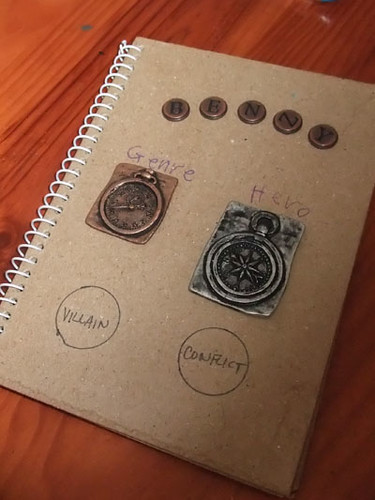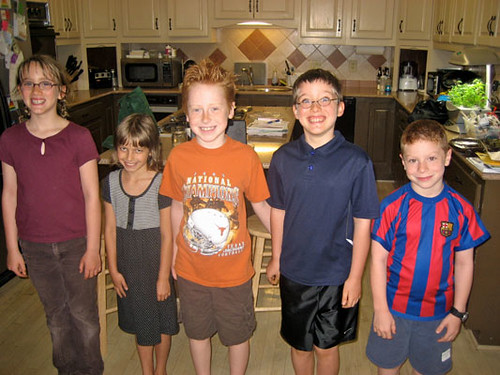In encouraging a child to write a novel, you're not just asking them to produce a book. You're promoting several important benefits in their education, and in their development as a person. Writing a novel, for kids and teens, really has very little to do with the final product, you see. While their books are fantastic and we love to read them, the true purpose of writing at this age is not to create the Next Big Book that will bring the publishing industry to its knees. It's all about the process, and kids learn much from the process of writing a novel. It's why we love NaNoWriMo. It's why I wrote my curriculum, "How to Teach a Child to Write a Novel." It's why I encourage my own kids to get their ideas into stories, their stories onto paper, to share with the world.
Firstly, children work out ideas and dreams in their novels, trying out different identities, exploring fantasies, and toying with systems and situations they may have run into in real life. A work of fiction is a giant "What if?" and it's a safe place to postulate. My son Benny created, for example, a "little brother" character in his novel. This kid was invested with all the sass, defiance, naughty behavior, and arrogance that he himself is not allowed to exhibit. The character, "Duane," was constantly in trouble, a permanent drain on his mother's patience. I could sense the glee that Benny was experiencing while writing Duane, and while it was hilarious I also thought it was useful. In writing the mother character as well, he was putting himself in the position of both parent and child, and in expressing this relationship, he understood better the way our relationship sometimes works.
Second, children (or adults) who write novels become better readers. A person who picks up a brush and begins to put paint on a canvas instantly knows about painting - the brush strokes, the paint consistency, the composition of a painting - on a much deeper level than they could have by just looking at art. In the same way, someone who has written, or even attempted to write, a novel reads novels with a new understanding of their construction. They watch movies differently. They construct their anecdotes differently. Once they've been taught about plot, climax, character goals, significant objects in the setting, and the rest of it, they see the books they're reading in a different way -- they're reading as insiders now, privy to all that information that only writers know, and appreciative of the effort and dedication that goes into writing a book.
Finally, a child who has written a novel has put his feet on a very elevated path. Having entered this elite "club" of novel-writers, he or she stands next to greats like Woolf, Faulkner, Asimov, Morrison, and Joyce. Writing a novel is one of the grand things you can do, as a person in this modern world, like running a marathon or scaling a mountain. It's an item on lots of people's list of things to do before they die, and doing such a large thing at such a young age gives an enormous sense of accomplishment. A kid should feel, stamping "THE END" onto the final page of a long hard effort, that having written a novel, he or she can accomplish anything.
For these reasons, and for the fun of it, Sherene and I put together the Book Arts Bash, a writing contest for homeschooled authors, where we hoped to encourage young novelists by taking their efforts seriously, and putting their work on the desks of real authors, agents, and editors. We recruited judges from the top tiers of the publishing industry: Sara Gruen, Holly Black, Joshilyn Jackson, Karen Abbott, and more. We offered a top prize of $100 in each grade group, and critiques from literary agents from the top three. It has been an astonishing success, and here are the results:
Kindergarten and First Grade:
Winner:
A Big Problem by Brianna T.
Runners up:
Adventures of Big D and BMC by Emma W.
Zoo With A Strange Zookeeper by Vivian L.
Second and Third Grade:
Winner:
The Adventures of Blue Flame the Heroic Giant Squid-Fighting Hero by Sage M.
Runners Up:
Ruby, A Twisting Tale by Emilie M.
Mittens the Cat by Melea von T.
Fourth and Fifth Grade:
Winner:
1 by Nicci M.
Runners up:
One Girl Revolution by Sadie Z.
Blaze by Alexandra S.
Sixth Grade:
Winner:
The Princess by Lena G.
Runners up:
Becoming Callie by Lena G.
Trixie by Lydia A.
Seventh Grade:
Winner:
Happy Ending is a Place by Mandy H.
Runners up:
Violet Fire by Bryn B.
Kite by Hannah S.
Eighth Grade:
Winner:
Hollin by Garrett R.
Runners up:
Common Animals by Thomas B.
Little Angel by Adayla S.
Ninth Grade:
Winner:
Why I Missed the Second Set by Rose C.
Runners up:
Untitled by Larissa S.
Tales of the Humbats: The Seventh Piece by Raven M.
Tenth Grade:
Winner:
Children of the Stars by Holden M.
Runners up:
Shattering Darkness by Vienna H.
The Scouser Cap by Emily V.
Eleventh Grade:
Winner:
Cadence by Scout G.
Runners up:
Vengeance: 25 cents by Kathleen M.
Don't Look Down by Tanya S
Twelfth Grade:
Winner:
If Pearls Could Sing by Pamela C.
Runners up:
Broken Things by Emily D.
Falling Night by Anna W.
Big thank you to our generous sponsors:
Dreambox: Visit Dreambox for an incredible interactive math curriculum for kids from preschool through third grade. For kindergarten math, Dreambox is unparalleled in fun and pedagogical value. Check out the free trial and see what you think!
Shurley Grammar: A grammar curriculum that takes your child from first through seventh grade, using drills and jingles to teach writing skills (and also reading skills!) along the way. A trusted name in home education, Shurley will not steer you wrong.
Classical Academic Press: If you're contemplating teaching Latin or Greek in your homeschool, you definitely need this system. With audio, video, fun activities, and online Latin games, as well as standard workbooks and quizzes, anyone can teach Latin.
Prufrock Press: Parents of gifted children often have difficulty finding work that will challenge their kids' abilities while still being fun. Prufrock's gifted education materials are a godsend. Kids see them as a treat!
Explode the Code: Many of us have used Explode the Code workbooks with our kids and enjoyed the progressive phonics curriculum. Now Explode the Code has launched an online version, taking their reading education to a whole new level.
Can you help us by republishing the results and sponsor links on your blog, supporting homeschooled writers and this novel-writing contest? Please email us or leave a comment to let us know you can help. We need twenty blogs to participate. Would you donate a post on yours? You can use this text file to copy and paste into your blog editing software. Right click to download.



